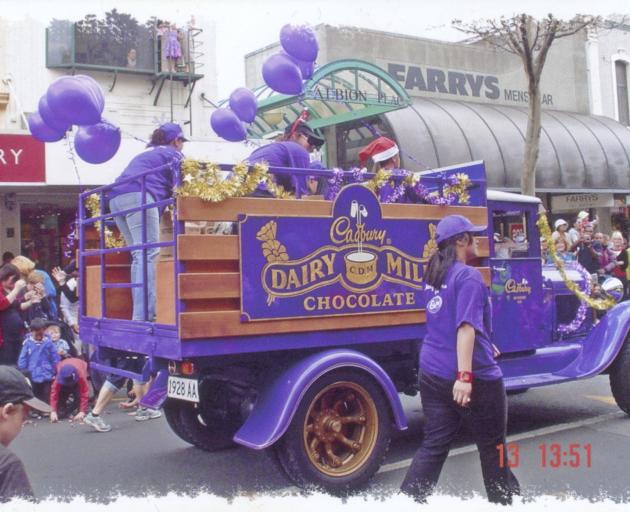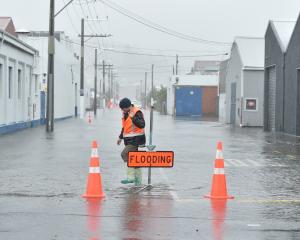
Cadbury was once one of the largest private employers in New Zealand. As the company winds down its iconic Dunedin chocolate factory, Bruce Munro talks to some whose connections span decades and, in one case, almost a century.
In the beginning, when the Creator was giving out stuff, New Zealand got ... pineapple lumps.

That's the gospel according to the classic mid 2000s television advert for Cadbury's bite-sized chocolate-coated chewy treat that has been called a national treasure.
But before pineapple lumps, before jaffas and even before Cadbury came to New Zealand, Fred Wheeler was working for the Dunedin chocolate and biscuit company, R. Hudson & Co.
Wheeler was 14 when he started working there, in 1922. He retired 68 years later, having been foreman of enrobers - in charge of covering all manner of sweet edibles in chocolate - for 40 years.
When the teenage Wheeler started his working life, the company founder, Richard Hudson, had already laid the foundation of what for many decades would be the country's pre-eminent confectionery company, housed on a block of land bounded by Cumberland and Castle Sts, in Dunedin.
According to Sir C.V. Smith, who was chairman and managing director of the company from 1939 to 1963, Mr Hudson, who had been orphaned at the age of 9 and came to New Zealand in 1865, was an astute businessman and caring employer who believed that everyone who contributed to a profitable business should benefit from its success.
Hudson was also a man with a quick temper and a short memory, Smith recalled in the company's 1968 centenary publication.
"One day, walking through the factory, he stopped one of the workmen and said, `Didn't I sack you three weeks ago?','' Smith wrote.
"`Yes', said the man, 'but you didn't mean it'.
"Richard Hudson had no reply.''
It is unlikely that Hudson, his six sons who succeeded him, nor any of the company directors who Wheeler worked under during his seven-decade career would have had any cause to sack him.
He was an extremely conscientious man, Wheeler's daughter Lorna Mercer (76) says. Through her father, Mercer's connection with the chocolate factory stretches back 95 years.

She was born and raised in one of the chocolate factory's flats where Countdown supermarket now sits. At that time, the company had flats, warehousing, a carpentry workshop, an engineer's workshop and a staff recreational rifle range on property across the road from the present site. The landmark chocolate crumb silos were also on the same land, nearer Moray Pl than where they now sit not far from the Dunedin Railway Station.
"Dad used to bring a bucket of chocolate home, pour it into a sponge roll tin with coconut and nuts and make his own chocolate rough,'' Mercer recalls.
"There was always chocolate around the home. And always lots of chocolate eggs at Easter. Everyone liked to come visit Dot and Fred.''
Now living in Mosgiel, Mercer says her dad, who was known as the "factory father'' for his many years of dutiful service, did not take a single sick day in all those years.
Mercer saw that fastidiousness on the home front.
"He would be home at five to 12 every day for his lunch. And he would go back to work at 12.25pm on the dot.''
Others saw and benefited from that same attitude in the factory.
Ted Barringer, who was managing director from 1963 to 1980, recalls, in his history of Cadbury, getting a phone call from Wheeler on New Year's Eve, at the end of 1972. Wheeler had discovered a tap left on in the staff cafeteria. It was causing a flood in a downstairs area where finished goods were stored.
After phoning the fire brigade, Barringer went down to the factory and worked with Wheeler to stack pallets of goods out of reach of the water.
At 3am, job finished, the managing director and the night watchman "welcomed in the New Year with several well-deserved glasses of whisky''.
The next day, Cadbury Fry Hudson became Cadbury Schweppes Hudson.
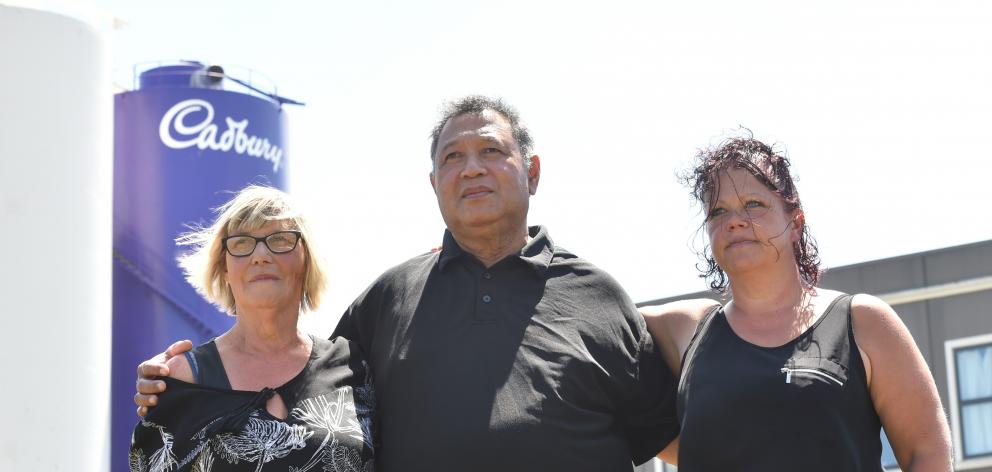
La Faatoese started working at the Dunedin confectionery factory in 1978.
For almost four decades he has been the cook, mixing and melting the ingredients that make up the centres of Cadbury's many chocolate-coated sweets. While all around him the factory has changed, almost beyond recognition.
Faatoese has been employed under the banner of Cadbury Schweppes Hudson, Cadbury's, Cadbury, Kraft and most recently Mondelez.
Many aspects of the job of sweet-making were not automated when he began.
For example, patterns were etched on the top of freshly enrobed chocolates by hand, using a fork.
And, several of the jobs required strength and effort that were beyond a good number of new employees.
"On the NID [machine] the trays had to be hand-rolled,'' Faatoese says.
"People would start at 8 o'clock in the morning. And when they went for cuppa tea at half past nine, they never came back. There were a lot like that.''
He laughs. There was a lot of laughter, and singing, back then, he says.
"All the ladies would be singing while they worked. It was very happy.''
Nowadays, it is a rare occurrence.

Cadbury has been a good employer, taking care of people when misfortune strikes, he says. Without elaborating, he says that at one point he got sick.
"They told me, don't worry about work. Take as long as you need.''
He was off work for two years. His job was waiting for him when he returned.
The factory was figuratively and literally a big family, he says. There were many examples of husband and wife, children and grandchildren all working in the chocolate factory, sometimes at the same time.
Faatoese's wife, Lili, was employed there until taking voluntary redundancy in 2008 and pursuing university study. She graduated this week with a degree in sociology.
His two youngest children, who studied medicine, also worked there during university holidays.
A year after Faatoese started his sweet cooking career, Cadbury was the victim of what is believed to be Dunedin's first armed hold-up.
In April, 1979, outside the Castle St head office, a man wearing a Balaclava forced a security guard to hand over the factory's $50,000 payroll ($270,000 in today's money). No arrest was made.
By 1992, a new chocolate-making plant, the most modern in the world, had been installed in Dunedin; the public was consuming about 22 million Moro bars each year; and, the factory had stopped producing biscuits.
That was the year Jenny Anderson started working in the Cadbury laundry.
When that work was outsourced, she joined her two daughters on the fourth floor, wrapping chocolates; the far end of the process that began with Faatoese mixing and melting ingredients. His mix was poured into moulds to shape the confectionery, then sent through an oven to set. From there, the centres were "enrobed'' in chocolate, refrigerated, wrapped and, finally, boxed ready for distribution and consumption.
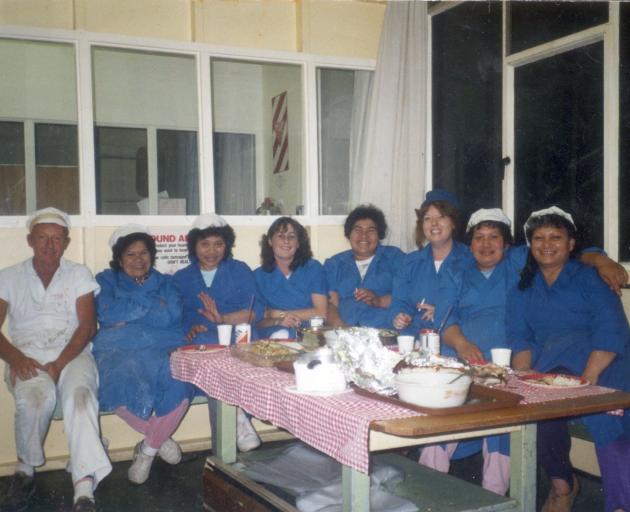
Anderson has thoroughly enjoyed her 25 years at Cadbury. It was more than a workplace, she says.
"You actually spend more time in there than you do with your family, especially when you're doing 10-hour days,'' she says.
Anderson joined the workplace tramping club.
She recalls several outings, including one expedition to Stewart Island.
At the end of a day's tramp, a few of the men had caught some crabs and paua and put them in billy tins. After dinner, there had been a bit of drinking. One of the managers decided a change was needed.
"He said, `Right, no more drinking. We'll have a cup of tea. Put the billies on','' Anderson says.
But when he got his cup he spat out the first mouthful, demanding to know "What the hell's wrong with this cup of tea?''.
No-one had emptied the billies that had been used to gather seafood. The cuppa had been brewed with brine.
"We did have some fun,'' she says with a chuckle.
The place has changed in recent years, but local management has worked hard to retain the old values, she believes.
"They've probably had to fight hard to do that, but they've done it.''
In 1997, the office of the managing director shifted to Auckland. A nervous Dunedin sent its then-mayor Sukhi Turner to talk to the company. She was given assurances of Cadbury's commitment to the city.

Teresa Gooch started working at Cadbury at the beginning of the new millennium.
She had trained as a nurse aide. But after a season getting the chocolate factory's much higher wages there was no going back; for the foreseeable future, at any rate.
Gooch has worked mainly on the wrapping line.
During the past 17 years, she has worked all three shifts at various times; day shift, from 8am to 4pm, night shift, from 4pm to midnight, and 15 years on the back shift, from midnight to 8am.
For many years, the staff social club was open for four hours after each shift. In the case of the back shift, from 8am to noon.
"That was always fun,'' she says.
"On a Friday morning, after working all night, come 12 o'clock we were pretty ... happy.''
But the social club was closed down about a decade ago, not long after Cadbury was bought out by Kraft, which soon spun out its confectionery arm under the moniker Mondelez.
The club has, however, been reopened for some staff events since the plan to close the Dunedin factory and relocate all production to Australia was announced in February.
It is curious how things can come full circle, Gooch says.
Early on, she worked on the Roses line, putting chocolates in boxes. Now, she is back on the same line, although the job is largely automated.
As a consequence, the number of people required to do the job has been halved.
"And yet, you're pumping out thousands more tonnage,'' she says.
"We've won global Mondelez awards for pumping out the most production.
"So, that's why it was a bit of a shock to be closing.''
The factory has also lost some of the family atmosphere, she says.
"But saying that, they are being very good to us, seeing us out.''
The 350 staff have been helped to get qualifications in manufacturing, food handling and first aid.

A few have left already. Some are relocating to work in Cadbury factories in Melbourne, Australia. The bulk of employees, about 220, will be gone by this time next week. The remaining 130 will be let go in three blocks covering the first quarter of 2018.
Faatoese, Anderson and Gooch will all be in the last batch to be dispatched, when the factory closes its doors for the final time at the end of March.
The last Cadbury confectionery line to be produced in Dunedin will be pineapple lumps.
When that stops, it will join the Jaffas, Buzz Bars, Pinky Bars ... being produced in Australia and exported to New Zealand.
"I feel pretty heartbroken really,'' Gooch says.
"It's sad for Dunedin. My grandmother and mother worked there. It would have been nice to think that possibly my son could have worked there, or his kids.''
Hearing the factory was closing was extremely upsetting and left her feeling directionless.
"It's been a real struggle for a lot of people.''
But she now feels some hope and even a little bit of excitement about her future.
To reward herself for the years of service to Cadbury, and for raising up her son on her own during that time, Gooch is going to shout herself an ocean cruise. Next, she might get her truck licence, as a back-up option, and then return to nursing.
Faatoese will be a little more than three months shy of qualifying for superannuation when he is made redundant. He hopes to find some part-time work to bridge the gap.
He feels most sad for the young workers who have started families and taken on mortgages.
"I don't know what they are going to do. I just wish them the best,'' he says.
Anderson says she has "absolutely loved working there''.
"I'm probably quite naive to a lot of things, but I liked the people and I hate the fact that it's closing.''
She is already 65 and will likely retire. But it will not be the end of her family connection with Cadbury.
In March, a granddaughter will be heading across the Ditch to work at one of Mondelez's two Cadbury factories in Melbourne.
Some of the plant from the Dunedin factory is being shifted there, and the company needs workers who know how to operate it.
Maybe her granddaughter will have a hand in making the pineapple lumps that turn up on shop shelves from next year; a gift not so much from the Creator anymore as from the Wizard of Oz.
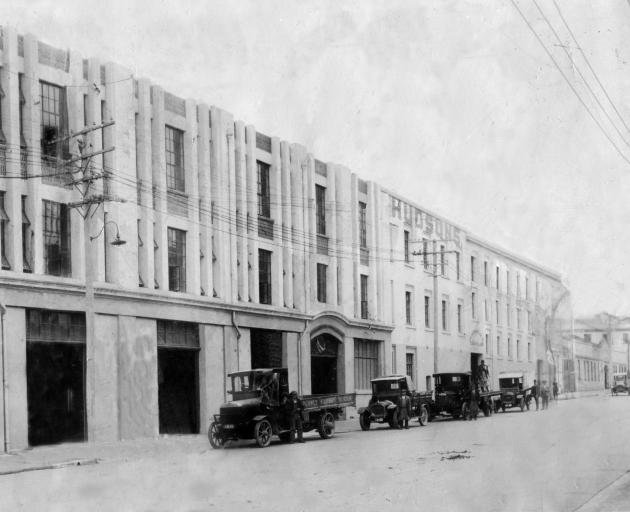
CADBURY DUNEDIN IN A (CHOCOLATE) NUTSHELL
1868: Orphaned at the age of 9 in the United Kingdom, Richard Hudson (27) arrives in Dunedin and opens his first biscuit bakery.
1884: Hudson opens what is believed to be the southern hemisphere's first chocolate and cocoa manufacturing plant, in Moray Pl, Dunedin.
1900: Two acres is added to property already purchased on land between Cumberland and Castle Sts.
1930: R. Hudson and Co merges with British chocolate manufacturer Cadbury Fry and starts producing New Zealand's first bar of Cadbury Dairy Milk chocolate.
1931: Cadbury introduces the Jaffa.
1939: World War 2 sees biscuit and chocolate production ramped up to fulfil military contracts.
1961: Pinky Bars go on sale for the first time.
1965: Cadbury opens a North Island factory in South Auckland.
1967: Cadbury Moro hits shop shelves.
1984: New chocolate-making plant installed in Dunedin is the most modern in the world.
1989: An increase in GST and the introduction of Instant Kiwi tickets significantly reduces sales of chocolate and biscuits for several weeks.
1997: Office of managing director shifts to Auckland, but reassurances are given of Cadbury's commitment to Dunedin.
2003: Cadbury World tourist attraction opens in Dunedin.
May, 2007: Cadbury is named New Zealand's most trusted brand for the fifth consecutive year.
September, 2007: Cadbury announces it is closing its Auckland factory, affecting about 200 jobs.
2009: Dunedin factory partially backtracks on the introduction of palm oil as a cocoa butter replacement after criticism from consumers and environmentalists. At this point it employs about 700 people.
2010: Cadbury is bought by Kraft, which later spins out its global snacks business and renames it Mondelez International.
February, 2017: Mondelez says it will close the Dunedin factory by March 2018, with the loss of about 350 jobs, but that Cadbury World will remain open.
June, 2017: Dunedin city councillor Jim O'Malley and a group of volunteers launch a crowdfunding campaign to keep the Dunedin factory running on a portion of the site. The plan is dropped because of Mondelez's stringent production and supply
requirements and difficulties acquiring manpower and machinery.
October, 2017: Cadbury announces it will shift all production of its New Zealand brands to Australia.
November, 2017: O'Malley's Own the Factory group launches a new crowdfunding campaign to buy and expand local craft chocolate manufacturer OCHO (the Otago Chocolate Company). It raises a record-breaking $2 million in 32 hours. The expansion will allow it to employ more people, including a small number of former Cadbury workers.
December, 2017: About 220 Cadbury staff will be made redundant, joining about a dozen staff who have already left.
2018: The Dunedin plant will be progressively decommissioned. The about-130 remaining staff will be made redundant in three phases, with the closure of the factory by the end of March.
